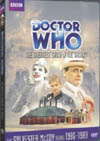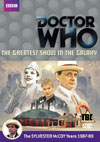The Greatest Show in the Galaxy
 |
 |
 |
DVD NTSC
Region 1




|
DVD PAL
Region 2


|
VHS Video
NTSC
 A A

NTSC
 B B

PAL


|
|
(Doctor Who Story No. 155, starring Sylvester McCoy)
- written by Stephen Wyatt
- directed by Alan Wareing
- produced by John Nathan-Turner
- music by Mark Ayres
- 4 episodes @ 25 minutes each
|
Story: A scary thing happened on the way to the circus....
Ace says she's always found clowns to be creepy, so an
interactive junk mail taunts her to prove she's not scared
of coming to see the Psychic Circus on the planet Segonax.
But the Doctor senses something more sinister at work on the planet.
Could it really just be a few malfunctioning robots in the area?
Is it merely stage fright setting into the varied collection of
new and old performers trying out for the circus festival?
Behind his smiling façade, the Chief Clown keeps deadly
strict control over circus activities. Does he know the true
unique reason why this show really MUST go on?
|
|
DVD Extras include:
- Audio commentary by combinations of
Sophie Aldred (Ace),
Jessica Martin (Mags),
Christopher Guard (Bellboy),
writer Stephen Wyatt,
script editor Andrew Cartmel, and
composer Mark Ayres.
Moderated by Tobe Hadoke.
- "The Show Must Go On" making-of featurette (30 min.)
with Aldred, Cartmel,
Ian Reddington (Chief Clown),
producer John Nathan-Turner,
director Alan Wareing,
designer David Laskey, and
visual effects assistant Mike Tucker.
- Deleted and extended scenes (11 min.)
- Unused model effects shots (2 min.) introduced by Mike Tucker.
- "Tomorrow's Times" featurette (14 min.) on media coverage of
the Sylvester McCoy era, hosted by Anneke Wills.
- Isolated Music by Mark Ayres
- "Remembrance Demo" - two scenes of "Remembrance of the Daleks" (story no. 152)
rescored by Mark Ayres (3 min.)
- Pop-up Production Note Subtitles
- Photo Gallery music montage (7 min.)
- "Victoria Wood" TV sketch (1 min.)
Buyers' Guide Review
by Martin Izsak
|
|
(A more in-depth analysis, containing "SPOILERS" and intended
for those who have already seen the program, can be accessed
here.)
|
Here we come to another of the three big success stories of the
Sylvester McCoy era. In fact, this is probably the best
"candy-horror" story Doctor Who
has had yet, neatly conquering the usual believability and stylistic
problems, while crafting a good narrative for an interesting collection
of characters.
Even if, like me, you hate "rap" music, don't let the Ringmaster's
opening verse, or any of the subsequent short ones in later episodes,
put you off, because what follows is a good, engaging adventure.
Time is taken to introduce characters properly in this story, and
to celebrate who they are with enjoyable scenes. To that end, we get
the best TARDIS interior scenes of the entire Sylvester McCoy era here.
These are important, as they establish our main characters' reasons for
going through the adventure, while also establishing Ace's major character
arc for the story. Although she will get many good moments that work
with that arc on the planet, no doubt her journey wouldn't work half as
well without these important set-up scenes. And thumbs up for another good
TARDIS materialization - the McCoy era usually satisfies in that respect.
Most of the guest characters are well drawn, and get economical
yet substantial scenes to demonstrate themselves to the audience,
scenes that integrate quite a number of good action beats providing
good structure to the story. Even with many of the characters being
parodies of certain archetypes, they never quite
drift so far from normality that the audience can't understand where they're
coming from, and one does become emotionally engaged with most of them.
The circus idea also encourages recognition and acceptance of at least
two layers with each character - the performance they display professionally
vs. their real emotionally vulnerable self that waits to be unmasked.
The mystery twists for each character provide a lot of the intrigue for
later story developments....
Characters are also quite well motivated in this tale, with the circus
and its festival for new amateur recruits providing a simple and effective
primary external layer for understanding why these characters are there
doing what they're doing. Any actions that may raise questions are
deliberately meant to.
A lot of the believability problems commonly associated with
candy-horror stories are helped by setting the story on an alien planet,
which injects
a healthy amount of unknown into the set-up of the situation that we have
here. Additionally, we get to see the best of Sylvester McCoy's Doctor
as an explorer of the unknown in this story, instead of the usual
long-term manipulator who already knows what's going on. Nice.
"It was your show all along."
Of course, the circus is working on another completely different level
as well, becoming a parody of television programming in general, and the
peculiarities of Doctor Who and its fans, general audiences, and
television bosses in particular. With this device, John Nathan-Turner
and the rest of the team get a chance to say things they might never
otherwise say, and the story is littered with many nice little
observations on the subject.
This is a fun parody
that really works as icing on the cake of a good story.
Of course, as much as Stephen Wyatt's writing here is a vast improvement
over his efforts for
"Paradise Towers" (story no. 149),
writing by itself, particularly in this style, won't ever quite be enough
to guarantee success on the big or small screen. Thankfully director
Alan Wareing seems to have been able to make time to wrap his head around
the aims of the story, and get his actors and production team to follow suit.
The believability continues through the performances, maintaining good
levels of seriousness where appropriate. Camera angles demonstrate
much higher levels of creativity than usual for Doctor Who - even where
we simply have the Doctor and Ace walking along on location, time is found
to emphasize Ace's boredom and expectations of disappointment simply by
the way she walks along. For his directorial debut on this show,
Wareing knocks this one out of the park. (...and in actual fact
out of the studio too, but that's another story.)
|
Also making his Doctor Who debut is composer Mark Ayres,
whose music also does much to sustain correct mood, increase tensions,
and make the whole thing quite cool and enjoyable to listen to.
Of particular excellence is the fact that the musical themes of this
story are not so much attached to external ideas like specific characters,
but more importantly to the thematic subtext of the story, emphasizing
the ideological struggles that fuel the characters' motivations.
This is a deeper and more satisfying level than that which
1970's composer Dudley Simpson usually seemed to settle for,
and I love it. The use of a new sixties-style melody helps to make
this a very compelling score, and it remains my favourite
of Ayres' three scores in the canon so far.
|
Music by Mark Ayres
The complete score is available on:
A selection of cues (some edited) is also available on:
|
|
Dave Chapman's post-production effects also deserve mention,
as they are nearly as good as here as they were back in
"Remembrance of the Daleks" (story no. 152).
Good visual laser effects feature everywhere you'd want them,
plus many good picture mixes feature on shots that establish or
celebrate the circus's alien planet location. Nice.
Although I rarely say this about other classic Doctor Who stories,
I think wide screen might have benefitted this tale, particularly
in allowing some of these lasers some better traveling distance before
they exit the frame. However, I will emphasize that I'm talking about
"wider screen" when shooting, not TV's usual 4:3 ratio cropped off
after the fact, like the silly Fiona Cumming remakes for
"Enlightenment" (story no. 128) and
"Planet of Fire" (story no. 135).
There are lots of good performances in this story, but Ian Reddington
stands out as the Chief Clown. In many ways he offers a lot of the same
qualities you'd want from the Master - and Anthony Ainley's Master
in particular: the elegance, the calculated sinisterness,
even the odd sympathetic beat, while exaggerating the style slightly
and getting away with it due to the character being a performer already
in a very unique and bizarre situation.
The story also caters to Sylvester McCoy's abilities as an actor,
particularly for the concluding moves,
allowing him to make a few more inimitable marks on the long-running
character. It would be hard to imagine most of the other Doctors
pulling off what McCoy does here, although no doubt William Hartnell's
facial expressions would be priceless should he have had a chance to try.
But Davison, Eccleston, or Matt Smith? ...fuhgedaboutit.
The story is also really good for Ace, as she matures from the newbie
she was in
"Dragonfire" (story no. 151) and
"Remembrance of the Daleks",
and develops the more fluid relationship she shares with the Doctor in
"Silver Nemesis" (story no. 154) and
"The Happiness Patrol" (story no. 153),
while also proving that
she isn't about to succumb to Janet Fielding's theory that every
companion breaks the mould in their first story, and then falls right
back into it for the rest of their run. Ace is going to continue
to be interesting and inimitable herself in nearly every story she gets
to participate in. Good one.
Bottom line: This is an excellent story that also remains unique
amongst the rest of the entire Doctor Who canon.
If you still haven't got this one in your collection,
you ain't seen nothing yet!
Season 25 Rankings:
Best Story:
- Remembrance of the Daleks
- The Greatest Show in the Galaxy
- Silver Nemesis
- The Happiness Patrol
Best Director:
- Alan Wareing (The Greatest Show in the Galaxy)
- Andrew Morgan (Remembrance of the Daleks)
- Chris Clough (Silver Nemesis / The Happiness Patrol)
|
Best Music:
- Mark Ayres - The Greatest Show in the Galaxy
- Dominic Glynn - The Happiness Patrol
- Keff McCulloch - Remembrance of the Daleks
- Keff McCulloch - Silver Nemesis
Best Writer:
- Ben Aaronovitch (Remembrance of the Daleks)
- Stephen Wyatt (The Greatest Show in the Galaxy)
- Kevin Clarke (Silver Nemesis)
- Graeme Curry (The Happiness Patrol)
Best Video Effects:
- Remembrance of the Daleks (Dave Chapman)
- The Greatest Show in the Galaxy (Dave Chapman)
- The Happiness Patrol (Dave Chapman)
- Silver Nemesis (Dave Chapman)
|
This story is available on DVD and VHS video.
Click on the Amazon symbol for the location nearest you
for pricing and availability:
 |
 |
 |
DVD NTSC Region 1
for the North American market:

 in the U.S.
in the U.S.

 in Canada
in Canada
|
DVD PAL Region 2

 for the U.K.
for the U.K.
|
VHS Video
NTSC
 A A
 in the U.S.
in the U.S.
NTSC
 B B
 in the U.S.
in the U.S.
NTSC
 A A
 in Canada
in Canada
NTSC
 B B
 in Canada
in Canada
PAL

 for the U.K.
for the U.K.
|
|
Comments on this article are welcome. You may contact
the author from this page:
Contact page

LYRATEK.COM
|
Read the Buyers' Guide Review for the next story:
"Battlefield"

|
|










